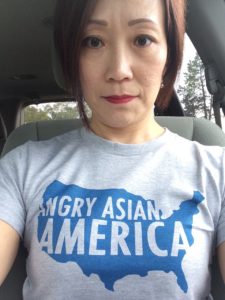 ****No editing here. Getting this written down quickly because I am still angry, shaken, sad. You never get used to everyday racism.
****No editing here. Getting this written down quickly because I am still angry, shaken, sad. You never get used to everyday racism.
No, I wasn’t wearing this shirt today, but the image fits. And if you don’t know about AngryAsianMan.com now you know.****
The older man walked up to the closed register next to me and looked at the wretched KFC/Pizza Hut menu at the travel oasis/rest stop near Elkhart, IN. He asked about the fried chicken hiding behind the greasy cough-guard. I wondered if he was going to do what I thought it looked like he was going to do, and I wrestled with what I would do if he tried to cut in front of the line. He stands with a curve in his back, pants hemmed too short and hair disheveled. He is older, if not elderly, with white, thinning hair. I can’t take the Korean out of me. We respect our elders. Should I just let him go? I just want to feed my sons terrible fast food, get back on the road and get home.
But he goes on, putting in his order and pulling out some money, and the cashier tells him there is line that he will have to join. The line is now about 8 people deep, not including me and my two teenage sons.
The older man, let’s call him Gerald, looks back at the line, looks at me and asks, “What do you need food for?”
I’m hoping he is joking, though he isn’t cracking a smile, so I respond as kindly as I can with a smile (I have now listened to Hamilton five times on this road trip and I can’t stop thinking “talk less, smile more”), “I need food to eat, just like you do.”
Gerald looks at me and my sons and says, “You don’t need food. Go back to your country and eat the food there.”
By the way, Gerald is white. I am not.
Oh, FFS.
My first instinct is to put myself in between Gerald and my sons who are 17 and 14 and both taller and bigger than I am, but I am their mother and I will always put myself between them and perceived danger.
Remember. There are at least eight people watching this unfold.
What would you hope you would have done if you were behind me in the line??? W??hat would you hope others would have done or said as they watched this unfold?
I wrote briefly about this encounter on my Facebook page, and everyone wants to know what I said, but I want to know if you have ever seen anything like this happen to someone else? And if so, what did you do? Did you say anything?
Because that is part of why I am still upset, unnerved, angry, sad, and exhausted. I am not told to “go back” every day in the literal sense, but many Asian Americans, American-born and immigrants, will tell you that we experience this “othering” often, especially here in the Midwest.
Non-Asian Americans of all shades often seem unable to “place” me in discussions on race because I do not fit neatly into the Black/White binary and Asian American history, art, literature, etc. are not always taught in American history even though “we” have been around for centuries here in the United States.
Which brings me back to Gerald and the silent line.
My response was to first step in between my sons and Gerald. My second response was to whip out my phone camera, but I didn’t catch him. What I caught was his face getting closer to mine as I told him, “I have money. This is my country, and there is a line.”
Eventually a younger white man, let’s call him Brad, steps in between me and Gerald and de-escalates the situation.
I am exhausted. In that 90-second exchange I went through the mental gymnastics of wondering what I could do to de-escalate the situation, how I could show the man Christ-like grace, if Gerald was some how mentally challenged, allowing age to be an excuse for his racist comment, wondering if anyone else was going to step in, hoping it didn’t escalate but not ready to stand down and behave whatever behaving means at that point, wondering what my sons were taking away from this experience, hoping they weren’t too embarrassed, embarrassed as we then had to stand there and wait for our food, angry that I felt embarrassed, tired that this was nothing new because it has happened to me since I was a child.
So here is a lesson for all of you, my dear readers, who have never been told to “go back to your country”. Now that you know this really happens here in the United States, how will you prepare yourself to step in? What will you do when something like this happens in front of you?
Remember, there were at least eight other adults in that line who said nothing.